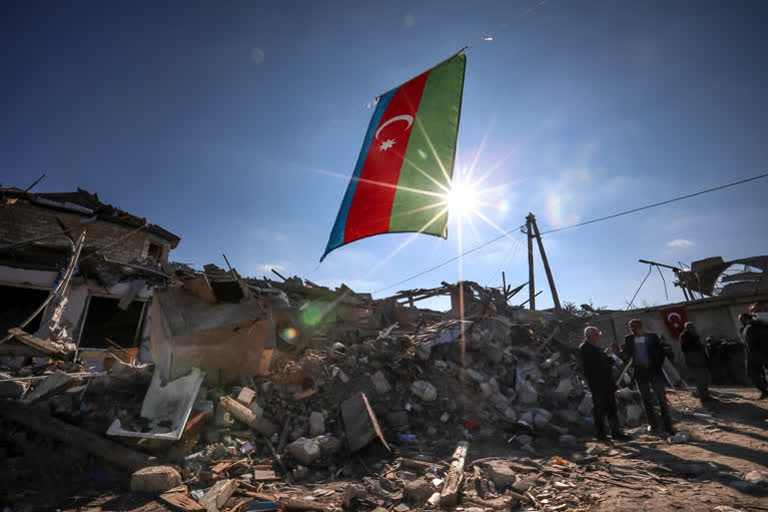New Delhi: A simmering, decades-long conflict between Armenia and Azerbaijan over the enclave of Nagorno-Karabakh erupted in late September into the worst fighting the area had seen since an inhuman ethnic war in the 1990s.
Skirmishes have been common for years along the front lines of Nagorno-Karabakh, which is internationally recognized as a part of Azerbaijan but is also home to ethnic Armenians.
To end the decade long conflict, Russian President Vladimir Putin on Tuesday brokered a new peace deal between Armenia and Azerbaijan. Although multiple ceasefire agreements were signed ever since the conflict restarted in September, none succeeded in maintaining peace at Nagorno-Karabakh.
So what is the new peace deal all about and how it is going to be significant in ending the decade long conflict which led to the killing of thousands of civilians and many displaced.
In an exclusive interview with ETV Bharat, Former Ambassador to Armenia Achal Malhotra said, “The deal has several important components. It would put an end to the deadly war which has stretched for several days and led to the killing of innocent civilians. The core issue — the status of Nagorno-Karabakh, however, remains unresolved and it remains to be seen as to how it will be addressed shortly.”
Here are the excerpts from the interview
What is the new peace deal between Armenia and Azerbaijan? How significant is it?
Armenia-Azerbaijan deal brokered by Russian Federation has several important components. It will put an end to the deadly war which has stretched for several days and led to the killing of innocent civilians also. Secondly, Armenia has agreed to withdraw in a phased manner from several territories which it has occupied during the war in 1994. Thirdly, Armenia and Azerbaijan have agreed to the deployment of Russia’s peacekeeping forces in the disputed areas and along the borders. The core issue — the status of the Nagorno-Karabakh, however, remains unresolved and remains to be seen as to how will it be addressed shortly. Also, it is not clear as to what role the OSCE Minsk group will play in the resolution of the dispute from here onwards.
The peace deal has triggered violence in Armenia and celebrations in Baku? What do you think the outcome would be?
Azerbaijan has every reason to celebrate as it has been demanding for over 25 years that its territories which were occupied by Armenia during the war in 1992-1994 must be returned to Azerbaijan as part of any deal. Today, Azerbaijan has been able to capture one of the key towns — Shusha. Not only that, Armenia has agreed to withdraw from several of its territories which it has occupied during the early ’90s. Furthermore, Armenia has also agreed to provide a land corridor between Azerbaijan and its autonomous region of Nakhchivan for which they have to travel through Armenia because its geographical location is such that the autonomous region of Nakhchivan which belongs to Azerbaijan was separated from Azerbaijan by Armenia. On the contrary, Armenians are utterly disappointed; they feel cheated and feel their leader Nicole Pashinyan has betrayed the cause of the people. Their national pride is hurt and is finding expression in demonstrations that they are holding. And, the demonstrations became violent when the Armenian protesters attacked the Parliament. But this is quite understandable as they feel that from here onwards, they will be able to negotiate only from the position of weakness. Therefore, they are genuinely concerned over the prospects of ethnic Armenians inhabited Nagorno-Karabakh.
Also Read: Fighting over Nagorno-Karabakh region goes on despite US mediation
What are the stakes for Russia?
The peace deal has further consolidated Russia’s position in the region which falls in the backyard of the Russian Federation and which Russia considers it as a sphere of its natural influence. Russia already has a military base in Armenia and it has its soldiers deployed on Armenia-Turkey or Armenia-Iran borders. Now according to the deal, Russia will also be displaying its peacekeeping forces in the region. Earlier in 2008 when Russia fought a war with Georgia over the two breakaway regions of Georgia namely Abkhazia and South Ossetia, it had gone ahead and recognised the independence of those two territories and since then it has established its palpable presence on those two territories including Abkhazia which is located on the black sea and therefore has a significant location from the strategic and security point of view.
Azerbaijan is saying that Turkey will play a role in the peacekeeping process? Will the Armenians accept that?
Well, Turkey is a member of the 11th member of OSCE Minsk group which was assigned the task of resolving the Nagorno-Karabakh conflict but so far Armenia has been able to resist Turkish role in the resolution process because it has extremely poor relations with Turkey and also it thinks that Turkey is heavily biased in favour of Azerbaijan. But now the situation has changed. Although Azerbaijan has claimed that Turkey will play an important role, there is no independent confirmation about the role Turkey is likely to play. Also, there is no clarity as to what role the OSCE is going to play from here onwards. Moreover, besides Armenia, I think even Russia may not be interested in Turkey getting actively involved in the resolution of the conflict process because, in some way, it would have an impact on Russia’s role and may lead to the dilution of Russia’s influence in the region.
Also Read: U.S election 2020 outcome: What it means for India and the world if Trump or Biden wins



